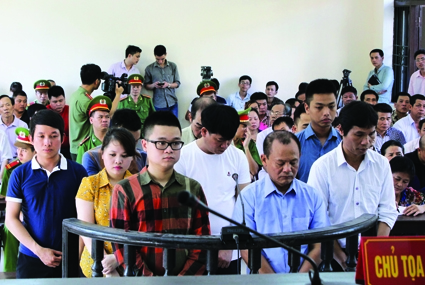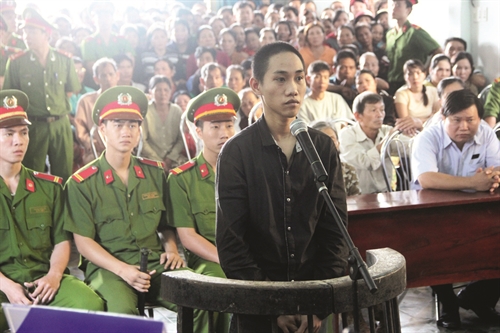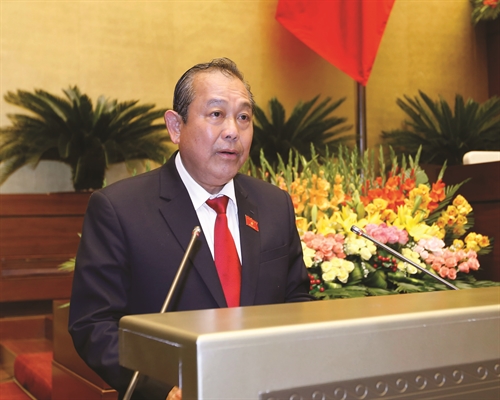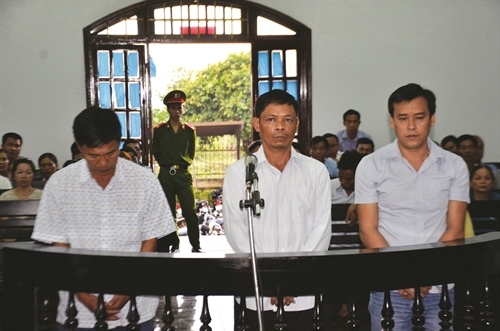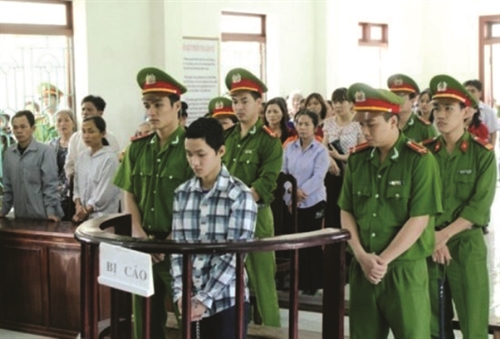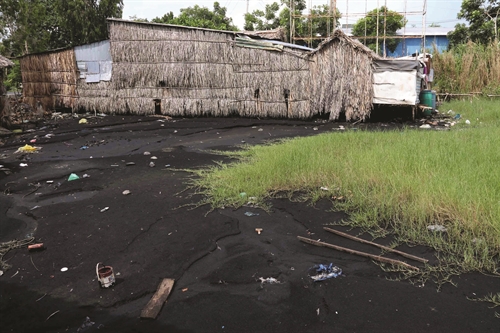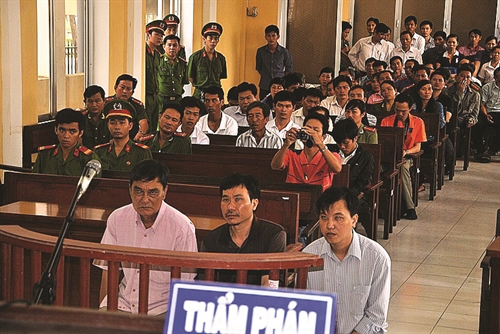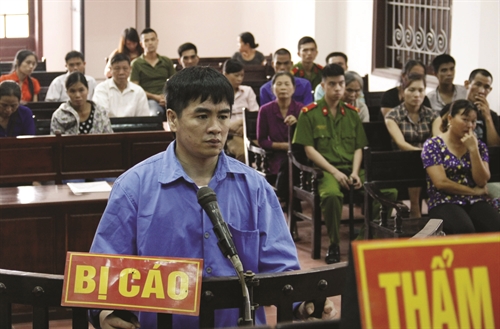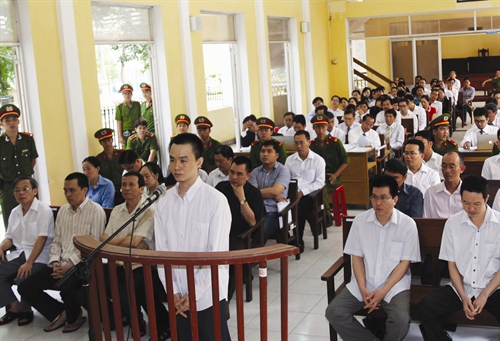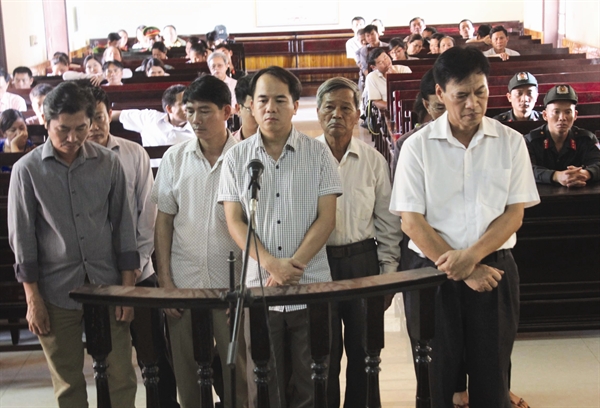Lawyer Do Ngoc Quang
Vietnam Bar Federation
Three Criminal Procedure Codes were promulgated in Vietnam in 1988, 2003 and 2015. The latest Criminal Procedure Code (the Code) was designed to meet the judicial reform requirements set forth in the Communist Party of Vietnam Central Committee’s Resolution No. 49-NQ/TW dated June 2, 2005:
“To vigorously reform judicial procedures toward democracy, equality, publicity, transparency, strictness and convenience; to ensure quality of the adversarial process at court hearings and use results of this process as an important basis for making judgments, regarding these as a breakthrough to raise the quality of judicial activities.”
Compared to the 2003 version, the Code contains 176 new articles and 317 amended articles, retains 17 articles and abolishes 26 articles. Significantly, it introduces many new contents of a modern criminal justice which Vietnam is striving to build.
1. For the first time ever, the adversarial principle is introduced in the Code as an acknowledgement that Vietnam’s criminal justice does not apply an accusatory system but a fair system for the accusing side (investigating body and procuracy) and the accused side (the accused and defendant) with the legal aid of defense counsels. On this principle, Article 26 of the Code stipulates:
“In the course of initiation, investigation, prosecution or trial of a criminal case, investigators, procurators, other persons competent to conduct the proceedings, criminally charged persons, defense counsels and other participants in the proceedings have the equal right to present evidence, assess evidence, and make requests to clarify facts of the case.”
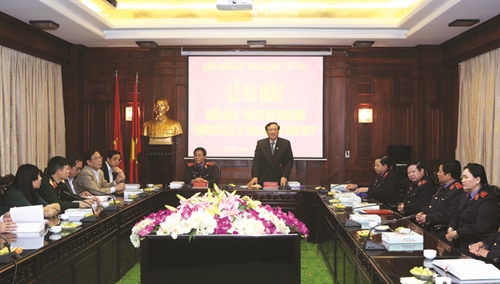 |
| A ceremony held by the Supreme People’s Procuracy to introduce the book titled “New contents of the 2015 Criminal Procedure Code” __Photo: Phuong Hoa/VNA |
Equality between the adversaries is demonstrated through their right to present evidence, check the authenticity, relevance and lawfulness of evidence, and assess the value of each evidence as well as the whole body of evidence at a court hearing. All inculpatory or exculpatory evidence, circumstances aggravating or extenuating penal liability, the application of points, clauses and articles of the Penal Code to determine crime and penalty, material evidence and other facts significant to the settlement of a case must be presented, discussed and clarified at a court hearing.
The purpose of the adversarial process at a court hearing is to determine whether the defendant is guilty according to the procuracy’s indictment. Thus, Article 26 of the Code states: “A court hearing to adjudicate a criminal case shall be attended by all the persons specified in this Code.”
The participation of procurators, defendants, defense counsels, victims, involved parties, witnesses, expert witnesses, property valuators and investigators in a court hearing will help the trial panel examine evidence of the case in an objective manner. If any of these persons cannot come to a court hearing due to a force majeure event, an external obstacle or another circumstance as prescribed in the Code, the court must postpone the hearing until such person can appear (Article 297). Under the Code, the trial panel may, during a court hearing, even summon investigators and competent persons who have accepted and settled the case and other involved persons to present matters related to the case. This is a new provision aiming to prevent unjust trials due to biased and unlawful acts of investigators in the course of collecting inculpatory evidence.
To guarantee the adversarial process at a court hearing, Article 26 further stipulates:
“The court shall create conditions for procurators, defendants, defense counsels and other participants in the proceedings to fully exercise their rights and obligations and participate in the adversarial process before the court. A court judgment or decision shall be based on results of the examination and assessment of evidence and of the adversarial process at the court hearing.”
A court’s judgment rendered after a trial must fully record opinions of defense counsels, victims, involved parties and other participants summoned by the court to its hearing. The trial panel’s assessment must analyze inculpatory evidence and exculpatory evidence and determine whether or not the defendant is guilty. If finding the defendant guilty, the trial panel must announce the offense he or she committed under which point, clause and article of the Penal Code and other legal documents, aggravating circumstances and extenuating circumstances, and the penalty. If the defendant is not guilty, the judgment must clearly state grounds attesting to his or her innocence and the restoration of his or her honor and lawful rights and interests. If the trial panel rejects any inculpatory or exculpatory evidence, request or proposal of the procurator, defendant, defense counsel, victim, involved party and their representatives or defense counsels, it must expound its rejection and analyze the lawfulness of procedural acts or decisions of investigators, procurators and defense counsels in the course of investigation, prosecution or trial (Article 260). It must refrain from rendering a judgment without referring to the result of the adversarial process at a court hearing.
It can be said that the adversarial principle is institutionalized very specifically in Articles 250 thru 362 of the Code concerning first-instance trial and appellate trial of criminal cases.
2. The principle of presumption of innocence is officially provided for the first time in the Code. In the previous Codes, this principle was just mentioned in part. Article 10 of the 1988 Code and Article 9 of the 2003 Code stipulate: “No person shall be considered guilty and punished until a court judgment on his/her crime takes legal effect.” This provision is not only inadequate in terms of presumption of innocence but also easy to be misunderstood that a charged person is obliged to prove his or her innocence, otherwise he or she will be considered guilty.
The presumption of innocence principle is provided in Article 13 as follows:
“A person charged with a criminal offense shall be presumed innocent until proven guilty according to the order and procedures prescribed in this Code and the judgment of the court takes legal effect. If having insufficient grounds or being unable to clarify grounds for criminally charging or convicting a person according to the order and procedures prescribed in this Code, the bodies and persons competent to conduct the proceedings shall announce that such person is innocent.”
This principle substantially means that a criminally charged person (arrestee, detainee, accused or defendant) may only be considered guilty after being tried according to the law-prescribed procedures and convicted by a court’s legally effective judgment. A criminally charged person must be presumed innocent in all cases, whether he or she is arrested, held in custody, temporarily detained or even brought to trial without a conviction sentence or with a conviction sentence that has not yet become effective. A charged person is not bound to plead guilty because the burden to prove a charged person is guilty rests with the bodies and persons competent to conduct criminal proceedings. This also means that persons held in case of emergency and arrestees (Article 58), persons held in custody (Article 59), the accused (Article 60) and defendants (Article 61) have the right to present their statements and opinions without having to testify against themselves or being forced to plead guilty. On the contrary, it is the responsibility of the accusing bodies and bodies competent to conduct criminal proceedings to announce a charged person innocent when they cannot prove the offense of such person.
Since a criminally charged person must be presumed innocent until proven guilty according to the order and procedures prescribed in the Code, before and during a court hearing to try him or her, the accusing and accused sides have equal rights to proving. The accusing side is bound to prove the charged person guilty while the accused and his or her defense counsel have the right to prove his or her innocence or that he or she has committed an offense and there are many circumstances extenuating his or her penal liability. To this effect, documents and evidence in the case file transferred by the procuracy to the court for trial must be sufficient and lawful (Article 26).
When exercising the right to prosecution in the course of first-instance or appellate trial, the procuracy has to disclose the indictment and prosecution decision on the accusation against the defendant at a court hearing; raise questions, examine material evidence, conduct on-site examination; make arraignments and arguments, withdraw part or the whole of the prosecution decision; make a conclusion on another offense that is equivalent or lighter than the charged offense; present its view on the settlement of the case at a court hearing; present its opinions on an appeal or a protest; add new evidence; and argue with the defendant, defense counsel and other participants at a court hearing (Article 266). Meanwhile, the criminally charged person may present his or her opinions on related evidence, documents and objects and request persons competent to conduct proceedings to examine and evaluate them.
The Code’s provisions on the presumption of innocence principle mark a progress of Vietnam’s criminal justice in the process of international integration as many other countries have acknowledged this principle as a principle of the modern civilized justice aiming to protect human rights enshrined in the 1948 Universal Declaration of Human Rights and the 1966 International Covenant on Civil and Political Rights: “Everyone charged with a penal offence has the right to be presumed innocent until proved guilty according to law in a public trial at which he has had all the guarantees necessary for his defense.”
3. The Code increases the powers of persons conducting the proceedings and the rights of participants in the proceeding. It clearly states that only the head of the investigating body or procuracy has the power to issue a decision that limits human rights or citizens’ rights (Articles 36 and 41), while investigators and procurators have the powers to discover and clarify the truth of cases (Articles 37 and 41).
The Code adds investigators, controllers and evaluators as proceeding-conducting persons and specifies their duties when settling a criminal case.
The Code also adds nine groups of participants in the proceedings, including persons denouncing or reporting an offense or proposing initiation of a criminal case; persons who are denounced or reported to have committed an offense or against whom a criminal case initiation proposal is made; persons held in a case of emergency; arrestees; observers; property valuators; translators; defense counsels for lawful rights and interests of persons who are denounced or reported to have committed an offense or against whom a criminal case initiation proposal is made; and at-law representatives of criminally charged legal persons.
More importantly, the Code grants more rights to participants in the proceedings, depending on their roles. Specifically, Articles 58, 59, 60 and 61 state that criminally charged persons have the right to present their statements and opinions without having to testify against themselves or being forced to plead guilty. The accused now have the right to read and take notes of copies of documents relating to their accusation or defense or copies of other documents relating to their defense after the investigation is completed in order to prepare defense arguments at a court hearing. Defendants have the right to request the presiding judge of a court hearing to ask or, if the presiding judge agrees, to ask by themselves questions to participants in the court hearing. They also have the right to read the transcript of the court hearing and to request modifications to the transcript.
Participants with legal interests in the proceedings, such as victims, civil plaintiffs, civil defendants, persons with related interests and obligations, are also granted more rights to protect their lawful interests, as stated in Articles 56, 57, 62, 63, 64 and 65 of the Code.
Particularly, the Code requires observers, a new group of participants in the proceedings, to be present in certain investigating activities, including identification (Article 190), voice recognition (Article 191), body search (Article 194), search of residences, workplaces, places or vehicles (Article 195), forfeiture of correspondence, telegraphs, postal parcels and items at post offices (Article 197), seizure of objects and documents during a search (Article 198), scene examination (Article 201), examination of traces on human bodies (Article 203), and investigation experiments (Article 204).
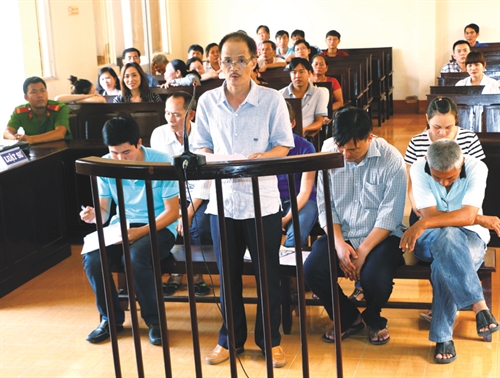 |
| Defendant Vo Thanh Cong, former director of Viet A Bank’s Bac Lieu branch, is sentenced to 18 years in prison for appropriating property through swindling and violating lending regulations __Photo: Huynh Su/VNA |
4. The Code provides specifically the participation of defense counsels and defense counsels for lawful interests of victims and involved parties in the proceedings, clearing all existing obstacles to the exercise of the right to counsel.
Five types of persons are now entitled to a counsel in criminal proceedings including detainees, the accused, defendants, persons held in a case of emergency, and arrestees (the last two types are new compared to the 2003 Code).
Under Article 72, a defense counsel may be a lawyer, a representative of a criminally charged person, a people’s advocate, or a legal aid provider in case a criminally charged person is entitled to legal aid. A legal aid provider, as added in the Code, will provide pro-bono legal aid for eligible persons specified in the Law on Legal Aid. A defense counsel may participate in criminal proceedings right from the time of initiating criminal proceedings against the accused. In case of an arrest or holding of a person in custody, a defense counsel may participate in the proceedings as soon as the arrestee is present at the investigating body’s office under a custody decision.
The Code also requires the appointment of a defense counsel to the accused or defendants charged for offenses punishable by 20 years in prison, life imprisonment or death penalty (Article 76), in addition to persons who are unable to defend themselves due to their physical or mental defects or who are below 18 years.
The Code replaces the grant of defense counsel certificate with the procedure of registration for defense. When registering his or her defense, a defense counsel must produce his or her lawyer card enclosed with a certified copy and the written request for a counsel of the criminally charged person or his or her representative or relative (Article 78).
A defense counsel now has more rights in defending his or her client compared to the 2003 Code. Specifically, he or she may be notified in advance by the body competent to conduct the proceedings of the time and place of interrogation and the time and place of other investigating activities; may collect evidence; investigate, assess, and present their opinions on relevant evidence, documents and objects and request persons competent to conduct the proceedings to examine and assess them; may be present in the confrontation, identification, voice recognition and other investigating activities; may request the bodies competent to conduct the proceedings to collect evidence and conduct additional expert examination or property revaluation; and may request the change or cancellation of deterrent or coercive measures, etc.
The Code adds a provision that persons who are denounced to have committed an offense or against whom a proposal for initiation of a criminal case is made may request a defense counsel for their lawful rights and interests. Such defense counsel may be a lawyer, a people’s advocate, a representative or a legal aid provider (Article 83).
5. The Code has added and revised provisions on proof, evidence, evidence sources, and competence to collect, examine and assess evidence in criminal procedures.
The 2003 Criminal Procedure Code contains confusing provisions on evidence and evidence sources. The Code has addressed such confusion and facilitated the collection and use of evidence with specific and clear provisions. According to Article 87 of the Code:
“Evidence may be collected or identified from the following sources: material evidence; testimonies and statements; electronic data; expert examination and property valuation conclusions; written records on initiation, investigation, prosecution and trial of criminal cases and judgment enforcement activities; results of performance of judicial entrustment and other international cooperation activities; other documents and objects...”
The Code emphasizes that facts that are collected not according to the order and procedures prescribed in this Code have no legal value and thus cannot be used as grounds for the settlement of a criminal case.
Concerning the preservation of material evidence, Article 106 of the Code requires competent bodies and persons to immediately return forfeited or temporarily seized property that is not material evidence to its owner or lawful manager. It orders material evidence being wild animals on the list of endangered, precious and rare species prioritized for protection; exotic animals and plants be delivered to specialized bodies for handling in accordance with law immediately after expert examination conclusions are available.
New sources of evidence under the Code include electronic data, property valuation conclusions, and results of performance of judicial entrustment and other international cooperation activities. Electronic data, as defined in Article 99, are symbols, letters, numbers, images, sounds or similar forms created, stored, transmitted or received by electronic devices. Electronic data may be collected from electronic devices, computer networks, telecommunications networks, transmission lines and other electronic sources. The evidential value of electronic data must be determined based on methods of creation, storage or transmission of electronic data; methods of securing and maintaining the integrity of electronic data; and methods of identifying creators and other appropriate elements. So, collected electronic data must be readable, audible or visible.
Regarding results of performance of judicial entrustment and other international cooperation activities provided by foreign competent bodies, Article 103 of the Code states that they may be regarded as evidence if they are consistent with other types of evidence of the case.
The previous Code assigns investigating bodies, procuracies and courts to collect evidence. This has given these bodies the exclusive power to accept or reject documents, objects and statements on matters related to a criminal case provided by other parties. To overcome this limitation, the new Code extends the right to collect evidence to other proceeding participants:
“In order to collect evidence, defense counsels may meet persons whom they defend, victims, witnesses and persons who know details of the case to ask about matters related to the case; request bodies, organizations and individuals to provide documents, objects and electronic data related to the defense. Other proceeding participants, bodies, organizations or any individuals may provide evidence, documents, objects and electronic data and present matters related to the case.” (Clauses 2 and 3, Article 88 of the Code).
These provisions aim to ensure the quality of evidence collected by the parties participating in the settlement of a criminal case.
6. The Code makes more specific and clearer provisions on deterrent measures and coercive measures in the criminal proceedings with a view to improving the punishment of crimes and guaranteeing human rights of persons against whom deterrent measures are applied.
The 2003 Code provides six deterrent measures including arrest, holding in custody, temporary detention, ban from travel, bail and deposit of money or valuable property as security. However, reality shows that these measures are not enough.
The Code replaces the measure of emergency arrest with holding of a person in a case of emergency. A warrant for holding of a person in a case of emergency must be approved by the same-level procuracy before it is carried out. In addition, arrest may be made to an offender caught in the act, a wanted person, an accused or a defendant for temporary detention, and to a person requested to be extradited (Articles 111, 112 and 113 of the Code). Article 116 stipulates:
“Within 24 hours after receiving a person who is held or arrested, the investigating body shall notify his/her being held or arrested to his/her family, the administration of the commune, ward or township where he/she resides or the body or organization where he/she works or studies. In case the held or arrested person is a foreign citizen, the investigating body shall notify his/her being held or arrested to the Vietnamese diplomatic mission for notification to the diplomatic mission of the country of which he/she is a citizen.”
The Code also provides strict grounds for temporary detention. According to Article 119, temporary detention may apply to an accused or a defendant charged with a serious offense or a less serious offense punishable under the Penal Code by imprisonment for over two years and there are grounds to ascertain that such person has been subject to another deterrent measure but still commits a crime; has no clear residence or an unidentifiable background; has absconded and is arrested under a pursuit warrant or shows sign of absconding; relapses or shows signs of relapsing into committing an offense, etc. An accused or a defendant who is a pregnant woman or nursing a child aged under 36 months, who is an old and feeble person, or who suffers a serious illness and has a residence and a clear background may not be detained but will be subject to another deterrent measure, except when he or she has escaped and is re-arrested under a pursuit warrant; relapses into committing an offense; commits an act of buying off, forcing or inciting another person to make untruthful statements or declarations or provide untruthful documents; destroys or falsifies evidence, documents or objects of the case, disperses property related to the case; intimidates, controls or takes revenge on a witness, a victim, a whistleblower or their relatives; and is charged for an offense infringing upon the national security and there are sufficient grounds to believe that he or she will commit acts detrimental to the national security unless he or she is detained.
Addressing the problems that no penalty is prescribed against a person who stands bail but lets the bailed person breach his or her obligations, that provisions permitting the deposit of money or property as security are unenforceable, and that measures of bail, deposit of money or property as security or ban on travel are not tied to any time limit and are likely to be prolonged throughout the procedural stages, the Code imposes fines on persons who stand bail in case they let the accused or defendants abscond, permits only the deposit of money as security, and adds time limits applicable to the ban on travel, bail and deposit of money as security, which must not be longer than those for investigation, prosecution and trial.
The Code also adds a deterrent measure of postponing the exit from the country:
“The exit [from Vietnam] of the following persons may be postponed when there are grounds to believe that their exit shows signs of absconding: a person against whom a denunciation or a proposal for criminal case initiation is made and who, through examination or verification of sufficient grounds, is suspected of having committed an offense and it is deemed necessary to immediately prevent him/her from absconding or destroying evidence; and an accused or a defendant. The exit postponement time limit must not exceed the time for processing information about an offense, institution of a criminal case, investigation, prosecution or trial prescribed in this Code. The exit postponement time limit for a person sentenced to imprisonment must not exceed the period from the time of pronouncement of the sentence to the time such person starts serving the imprisonment sentence.” (Article 124).
The Code adds the measure of account freezing to the three existing coercive measures of police escort, accompanied escort and distraint of property prescribed in the 2003 Code. Clause 1, Article 129 stipulates:
“Freezing of an account may be applied only to a person charged with an offense for which a fine may be imposed or a property may be confiscated or for the purpose of securing the payment of compensations for damage when there are grounds to believe that such person has an account at a credit institution or the State Treasury. An account of another person may also be frozen if there are grounds to believe that money on such account is related to a criminal act of a criminally charged person.”
7. The Code makes new provisions that the interrogation of an accused, taking of statements of a witness, a victim and an involved party, and confrontation may or must be audio-recorded or audio-video-recorded. Article 183 of the Code states:
“The interrogation of an accused at a custody house, a detention camp or an office of an investigating body or an agency assigned to conduct a number of investigating activities shall be audio-recorded or audio-video-recorded. The interrogation of an accused at another place shall be audio-recorded or audio-video-recorded at the request of the accused or a body or person competent to conduct the proceedings.”
Furthermore, the taking of statements of a witness, a victim and an involved party (civil plaintiff, civil defendant or person with interests or obligations related to a criminal case) and confrontation among them may be audio-recorded or audio-video-recorded on a case-by-case basis (Articles 187, 188 and 189). Listening to and watching audio recordings or audio-video recordings are provided in Article 313:
“In case of necessity to examine evidence, documents and objects related to a case or when a defendant denounces that extortion of testimony or corporal punishment has been taken against him/her, the trial panel shall decide to let relevant audio recordings or audio-video recordings be listened to or watched at the hearing.”
Under National Assembly Resolution No. 110/2015/QH13 of November 27, 2015, the legislature assigns the Minister of Public Security, in coordination with the General Procurator of the Supreme People’s Procuracy, Chief Justice of the Supreme People’s Court, Minister of National Defense, Minister of Planning and Investment, Minister of Finance and Minister of Home Affairs, to draw up a plan on physical foundations, apparatus and personnel as well as a specific roadmap for audio recording and audio-video recording of interrogations of the accused in accordance with the 2015 Criminal Procedure Code. By January 1, 2019, at the latest, the audio recording or audio-video recording of interrogations of the accused will be carried out nationwide.
8. The Code permits, for the first time, investigating bodies to apply special procedural investigation measures to support the collection of evidence. These measures, include secret audio recording, video recording; telephone tapping; and secret collection of electronic data (Article 223). They may only be applied in criminal cases involving offenses infringing upon the national security, drug-related offenses, corruption, terrorism or money laundering, and other organized offenses categorized as particularly serious offenses (Article 224). Only heads of provincial-level investigating bodies, heads of military investigating bodies at the military- zone or higher level are competent to decide on the application of the special investigation measures. They may issue decisions on application of such measures at their own discretion or at the request of chief procurators of provincial-level people’s procuracies or chief procurators of military zone-level procuracies. A decision on application of a special procedural investigation measure must be approved by the chief procurator of the same-level procuracy before it is executed (Article 225). The time limit for application of a special procedural investigation measure is two months from the date it is approved by a chief procurator. In a complicated case, such time limit may be extended but must not exceed the investigation time limit prescribed in the Code (Article 226). Information and documents collected through the application of a special procedural investigation measure may only be used for the institution, investigation, prosecution and trial of a criminal case (Article 227).
9. The Code establishes procedures for examining penal liability of legal persons.
In general, the grounds, competence, order and procedures for initiation of a criminal case or criminal proceedings against a legal person comply with general provisions of the Code. For a legal person to participate in the proceedings, Article 434 of the Code states:
“All procedural activities of a legal person examined for penal liability shall be conducted through its at-law representative. A legal person shall appoint an at-law representative and ensures his/her participation in all activities of initiating, investigating, prosecuting and adjudicating a criminal case and executing the judgment at the request of a competent body or person.”
When participating in the proceedings, the at-law representative of a legal person has rights and obligations similar to those of the accused in a criminal case (Article 435).
When criminal proceedings are initiated against a legal person or such a legal person is investigated, prosecuted or tried, it may be subject to such procedural coercive measures as distraint of a property related to its criminal act; freezing of an account related to its criminal act; suspension for a definite term of its operation related its criminal act; and payment of a sum of money as a security for judgment enforcement. The time limit for application of these coercive measures must not exceed the time limit for investigation, prosecution and trial (Article 436).
10. The Code contains a new chapter on protection of whistleblowers, witnesses, victims and other proceeding participants.
Very often during the settlement of a criminal case, would whistleblowers, witnesses, victims or other proceeding participants be threatened to have their life, health, property, honor or dignity infringed upon, which can scare them away from exercising their rights, thus causing difficulties to investigation, prosecution and adjudication activities. That’s why the Code has a new chapter on protection of whistleblowers, witnesses, victims and their relatives. When seeing signs of infringement upon their life, health, property or dignity, these persons may seek protection. Persons competent to conduct proceedings may decide to apply various protection measures, such as arranging guards, applying professional measures; restricting the movement and contact of these persons; keeping information about these persons confidential; changing the whereabouts, background information and personal identification features of these persons if they so agree; and preventing and stopping acts harming these persons. Article 486 of the Code, however, stresses that the application of these protection measures must not affect lawful rights and interests of these persons.-
